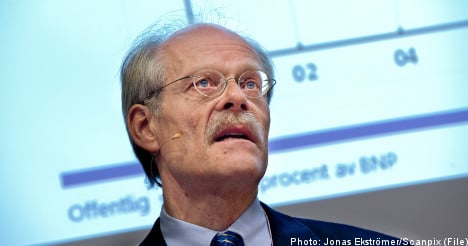According to the Riksbank, Sweden’s economic outlook has weakened due to developments abroad, particularly in the euro area.
“Sluggish growth in the euro area has subdued the demand for Swedish exports, which slowed down significantly in late 2011,” the Riksbank said in a statement, adding that it expected the repo rate to remain at current levels until sometime in 2013.
In addition, Swedish households are saving more and spending less and companies are also putting off planned investments, all of which will contribute to a slower growth rate for the Swedish economy.
The bank forecast economic growth to slow to 0.7 percent in 2012 before recovering somewhat in 2013, when the Riksbank expects the Swedish economy to grow by 2.1 percent.
The weak demand in the Swedish economy and abroad will also keep inflationary pressures low in the coming years, according to the Riksbank, which characterized the future for the Swedish economy as “uncertain”.
“The public-finance problems in the euro area in particular may become more serious and have more negative effects on the Swedish economy,” the Riksbank said.
“In this situation, the repo-rate path may need to be lower. On the other hand, it is possible that confidence in the public finances of the euro countries will recover more quickly than expected. This would call for a higher repo-rate path.”
Tor Borg, an analyst with SBAB bank, said the rate cut was expected, but that the lower forecast for the repo rate path was more aggressive than expected.
“It’s perhaps a bit more offensive than what people had expected,” he told the TT news agency, adding that he agreed with the Riksbank’s assessment of the Swedish economy.
“I very much think they should lower [rates], there’s no reason not to do it. There’s no inflationary pressure, growth is slow and there is huge uncertainty about what will happen in the world.”



 Please whitelist us to continue reading.
Please whitelist us to continue reading.
Member comments